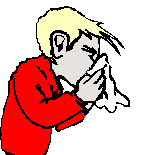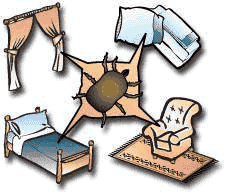Environmental Health Sciences
National Institutes of Health (NIH)
Department of Health and Human Services (DHHS)


NIEHS Kids' Pages Index!
| National Institute of Environmental Health Sciences National Institutes of Health (NIH) Department of Health and Human Services (DHHS) 
|
 NIEHS Kids' Pages Index! |

|
Asthma and Allergies
|
Asthma and allergy attacks have increased in the United States despite the fact that our outdoor air quality has improved. Some researchers think these problems have increased because kids are spending too much time indoors.
| When outdoors, we are exposed to pollens and dust, and other irritants. But when indoors, we are also exposed to "allergens". Allergens are proteins that originate from cockroaches, mold, pets, and dust mites (tiny bug-like creatures that live in dust). Allergens cause allergies.....and most people know that allergies can make you sniffle, sneeze, have runny and itchy eyes, and other cold-like symptoms. But allergens can also trigger asthma attacks, which are more serious. Asthma symptoms include wheezing (a high-pitched whistling sound heard when exhaling); coughing spells unrelated to a cold; shortness of breath, especially during exercise; and tightness in the chest. Allergic
asthma affects about 3 million children (8 to 12 percent of all children) and 7 million adults in the United States each year! Play our Dust Game
The "Dustmitezilla" Story NIEHS Asthma Resources , and learn more about Air and Your World Indoors | Cockroaches.... and dust mites...  are major problems! |

| What Can You Do?Reduce the allergens from YOUR environment! Most children with asthma are allergic to something, and so staying away from the "allergen" should help control the asthma. If you have asthma or allergies, stay away from animals, remove the teddy bears, rugs, curtains and lamp shades in rooms that you stay in a lot, like the bedroom . Plastic mattress and pillow covers, exterminators for pesky bugs, and the elimination of dust-traps like curtains and rugs in your bedroom may help you breathe easier. Or if it’s trees and pollen that get to you, air conditioning and air filters should help. Read a fun "make-believe" story about "Dustmitezilla", a dust mite of giant proportions! |
Children whose parents or brothers and sisters have asthma are more likely to develop it themselves. But even though our "genes" do play some part in whether or not we'll have asthma, researchers hope to make the most progress in fighting the disease by looking at the environmental aspect of asthma. The hope is that if kids encounter fewer allergens early in life, they’ll be less likely to develop allergic responses. Asthma research is performed at the National Institute of Environmental Health Sciences (NIEHS) and at the National Institute of Allergy and Infectious Diseases .
NIEHS and the National Institute of Allergy and Infectious Disease (NIAID)are also working together on an effort to help asthma sufferers. The project is called "TEAM", which stands for "Targeting the Environment and Asthma Management". To learn more about "TEAM" and other NIEHS asthma research projects, visit the following resources:
 , a free downloadable guide in PDF format for you and your child made available by Asthma Action America
, a free downloadable guide in PDF format for you and your child made available by Asthma Action America ; and visit their Asthma Control Test™
; and visit their Asthma Control Test™ , which helps people with asthma, 12 years of age and older, assess their asthma control and determine the need for discussions with their healthcare professional.
, which helps people with asthma, 12 years of age and older, assess their asthma control and determine the need for discussions with their healthcare professional. 

| Privacy and Accessibility, Disclaimers and Copy Requests |
NIEHS Kids' Pages Home NIEHS Home |
|
Links Disclaimer and Caution
|
|---|
When you encounter this image  or the words "Non-NIEHS Link", it means that by following that link you will be leaving the NIEHS website. NIEHS is NOT responsible for non-NIEHS websites. Sites maintained by outside organizations may be changed without notice to NIEHS. Therefore, unless the link is to another U.S. government sponsored webpage, endorsement by NIEHS is not implied, and NIEHS does not guarantee their continuing safe content or privacy policies. So please ask your parent or guardian before continuing to any non-NIEHS website, and especially before providing any information via the internet or by e-mail. When last reviewed, the websites linked from the NIEHS Kids' Pages seemed suitable for you to visit, but that may have changed; if you have any difficulties or concerns with any linked materials, please let us know. or the words "Non-NIEHS Link", it means that by following that link you will be leaving the NIEHS website. NIEHS is NOT responsible for non-NIEHS websites. Sites maintained by outside organizations may be changed without notice to NIEHS. Therefore, unless the link is to another U.S. government sponsored webpage, endorsement by NIEHS is not implied, and NIEHS does not guarantee their continuing safe content or privacy policies. So please ask your parent or guardian before continuing to any non-NIEHS website, and especially before providing any information via the internet or by e-mail. When last reviewed, the websites linked from the NIEHS Kids' Pages seemed suitable for you to visit, but that may have changed; if you have any difficulties or concerns with any linked materials, please let us know. |